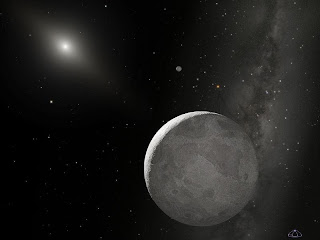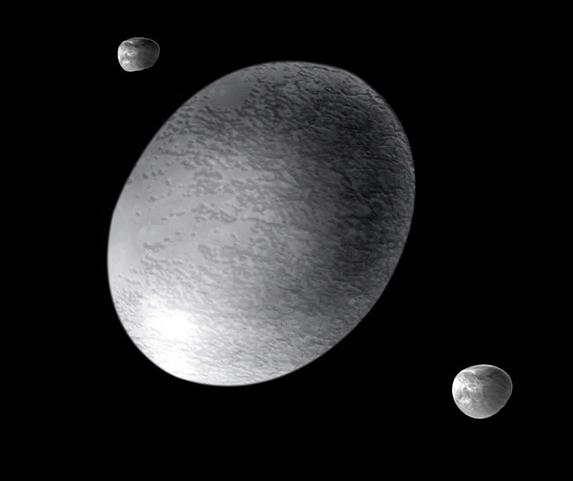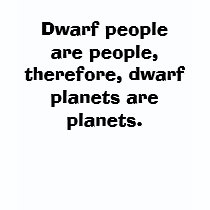I'm no scientist, and my opinion on the matter really has no credence, I understand, but I have done a lot of research on the subject, and I was pretty proud of myself for writing this. We turned our papers in on Finals day, and never bothered to pick it up from his office later, so I'm not sure what grade I got, but I passed the class and my professor complimented me more than once on my writing skills. I know a few people were interested in seeing what I wrote, so I decided for today's blog to publish, online, the final copy of my Pluto essay. Citations have been kept intact, and the photos were added just for this blog.
On August 24, 2006, a committee made a decision that changed the way people around the globe view their world. The International Astronomical Union, IAU for short, a group put together to organize astronomical research and act as the final authority in celestial discovery, met in Prague, in the Czech Republic, to go over findings from the past year. On their agenda was a movement to formalize the definition of a planet, a word with much meaning despite the fact that no singular definition existed yet.
Humans have known about planets since the beginning of history. The ancient Greeks, who believed the Earth to be stationary, with everything revolving around it, eventually differentiated between the 'wandering stars' and 'fixed stars' in the sky by calling the 'wandering stars' planets, from the Greek term 'wanderer', naming them after the gods (Weintraub). When the heliocentric model of the solar system, which places the sun in the center instead of the Earth, finally became commonly accepted, the Earth was added to the small list of planets, changing the common definition of a planet from an object which orbits the Earth to an object which orbits the Sun.

Over a thousand years of astronomical discovery followed, during which Uranus and Neptune were added to the list of planets and asteroids were discovered, referred to at first as minor planets. Now defined as asteroids, these space rocks were finally ruled out of the planet category by the astronomical community, though the IAU still refers to the larger of them as small planets (Shida, International Astronomical Union).
In 1930 Clyde W. Tombaugh discovered Pluto, a Trans-Neptunian object, or object orbiting outside of Neptune's orbit. The discovery of Neptune and Uranus had led astronomers to believe another planet existed and was affecting Neptune's orbit It was known as Planet X until it could be found and properly named. Tombaugh, a self-taught astronomer who impressed the Lowell Observatory, owned by the nephew of Percival Lowell who predicted the existence of Planet X with his skills, was hired to find Planet X.
Tombaugh designed a system of taking telescopic pictures of the night sky, and compared photos, searching for an object which moved differently than the stars around it. After a year of employment at the Lowell Observatory and a month of dedicated hard work, Clyde Tombaugh discovered what was soon believed to be Planet X, eventually named Pluto, a speck of light in his pictures which moved noticeably quicker than the rest, and the first planet discovered by an American. Ironically, years later, the prediction Percival Lowell preformed proved to be false, a miscalculation in Neptune's size, showing that there was, in fact, no 'Planet X' affecting Neptune's orbit. Pluto's discovery, then, was a fortunate accident.
For about 75 years, Pluto reigned as the ninth planet in the Solar System, the furthest, coldest, and smallest. In January 2005, however, another Trans-Neptunian object was found, larger than Pluto and orbiting the sun further away, discovered using a method similar to the discovery of Pluto. This object was known as Xena by the team that discovered it, referring both to the Planet X search that led to the discovery of Pluto and the Kuiper Belt, and the television show character. In September, 2006, the Kuiper Belt object Xena would be renamed Eris (Brown).
 |
| Artist rendition of Eris and its moon (just above it). |
The IAU, however, refused to admit this new discovery into the ranks of planets until after their August 2006 Prague General Assembly, during which they would finally define what it meant to be a planet and decide which objects fell under the definition. If Xena was to be left out of the ranks, as some astronomers proposed, then the reasons for leaving in Pluto, a smaller object, became few.
 |
| Ceres, Hubble space telescope. |
The IAU 2006 General Assembly in Prague did not focus specifically on one subject or another, but the problem of how to define a planet was a major focus. Even without the situation regarding Pluto and Eris, the definition of a planet was something that really did need to be decided on, and who else to do it besides the international committee formed to organize astronomical findings?
A first definition was put forward at the beginning of the week of the General Assembly. With IAU members regaining their right to vote on scientific matters, which had been revoked three years earlier at the previous General Assembly for no real reason, all IAU members attending the assembly, experts in various astronomical fields with PhDs, were asked to vote for or against an original definition of a planet; this would have ended with twelve planets in the solar system – the current eight, retaining Pluto and adding Pluto's moon, or twin planet, Charon, along with Ceres and Eris. When this definition was voted down by the majority of attendees, new definitions were written up, rewritten, voted on, and rewritten again.
The twelve-day assembly hosted over 2,400 participants, most of whom did not stay during the whole week and a half. Finally, on August 24, before closing ceremonies, a definition was decided on by the members attending at the time and adopted by the IAU, stated that an object was only a planet if:
- it orbits the sun,
- it is large enough for its own gravity to force it into an almost round shape and,
- it clears its orbit or neighboring space of competitors or other non- satellite bodies (Shida, IAU 2006 General Assembly...).
 |
| Hubble view of Eris |
“What is meant by ‘clearing its orbit?’” A professor in the department of Physics and Astronomy at Johns Hopkins University asked in an interview about his reaction to Pluto's demotion. JHU is responsible for the New Horizons mission, a space probe launch currently headed towards Pluto and Charon for a flyby that is expected to reach the now-Dwarf planet in 2015 (Beisser). “How does this relate to having an orbit overlapping Neptune? Clearly Neptune has not cleared its orbit” (O'Shea).
The professor brings up a good question, one that is echoed by colleagues in the field. Pluto's elliptical orbit brings it inside of Neptune's orbit for 20 out of every 248 years, and quite a few other Trans-Neptunian objects follow a similar pattern. Eris itself comes pretty close to Neptune's orbit, though it doesn't pass inside, and Jupiter, the largest planet in the solar system, has a group of asteroids known as the 'Jupiter Trojans' that share its orbital path (Marzari). How then can the IAU differentiate Pluto's somewhat crowded neighborhood with neighborhoods of other, more 'popular' planets.
 |
| Simplified image of Jupiter's orbit and the Trojan Asteroids. |
That isn't, of course, to say that Pluto isn't a popular planet, especially amongst laymen who know little more than 'My Very Educated Mother Just Showed Us Nine Planets,' the mnemonic device once taught in public schools to remember the planets' order. Astronomers, after the 2006 General Assembly resolution, reported receiving hundreds of letters from school children, devastated over Pluto's demotion. Groups have formed online in an effort to reinstate Pluto, and New Mexico and Illinois, as states, have declared Pluto 'still a planet' while in the sky above their respective states (Boyle).
With such a large public outcry against the planet's demotion, one question becomes apparent: who, exactly, are the IAU to say what is and is not a planet? Yes, they were formed in 1919 for the express purpose of organizing and designating astronomical findings, but they do not govern over scientific discovery itself. The IAU can not change what is true, only try to define or organize facts. Pluto underwent no change after the 2006 General Assembly; whatever it was then, whatever it was before it was discovered, and whatever it is now, has not changed since the object formed. It would be incorrect, then, to say that 'Pluto is no longer a planet', because if it isn't now, then it probably never was; unless a celestial event changed the object's build.
 |
| Artistic rendition of Haumea, the only ellipsoid dwarf planet. |
The problem of whether or not Pluto is a planet then comes back to what our definition of a planet is. At what point does a hill become a mountain, a stream become a river, or a dwarf planet become a planet? The IAU has defined what they think a planet to be and created an arbitrary 'dwarf planet' category to appease Pluto-enthusiasts, but if no one follows the IAU definition then it makes no difference.
I propose that such a definition can not be maintained properly by any one organization. The IAU has shown in this case to be unable to handle a clean format for reaching a decision by mutual consensus, but when it comes down to it, such a definition can only be considered opinion, never fact. The celestial bodies don't organize themselves into categories, it is humans that do these, and these categories created by our limited understanding are unable to fully represent scientific fact.
The New Horizons mission to Pluto and the Kuiper Belt will bring back more information about the now-dwarf planet, and possible tell us for sure if Eris is, in fact, larger than Pluto, or the same or smaller size, as it is now believed by some to be (Beatty). It is rash to try to define Pluto or any of the other dwarf planets – which now include Haumea and Makemake, discovered after the 2006 General Assembly – without having any real knowledge or understanding as to how these extraterrestrial bodies function. Our understanding and definition comes from weak observations made from across the galaxy, and the New Horizons mission, after it flies by Pluto in 2015, will be able to tell us more about this arbitrarily defined Dwarf Planet.
Until then, I propose that all planets, dwarf or no, be known singularly as planets. There are thirteen contenders in this solar system for title of planet – fourteen if one includes Pluto's twin, Charon, which is considered by some a moon or satellite and by others a twin planet – and most people don't even realize that five of them exist, even though their discoveries were startling. If the IAU really wants to familiarize the layman with astronomical discovery, they would do well to stop narrowing down their focus so everyone can understand exactly what exists out in our own solar system. The reasons, it appears, for demoting Pluto were few, while the reasons to promote this new 'Dwarf' class back up to the class of 'planet', at least until our knowledge on the world outside our own planet is more fully realized, are many.
 |
| A T-shirt I found online that nicely sums this up. |


No comments:
Post a Comment